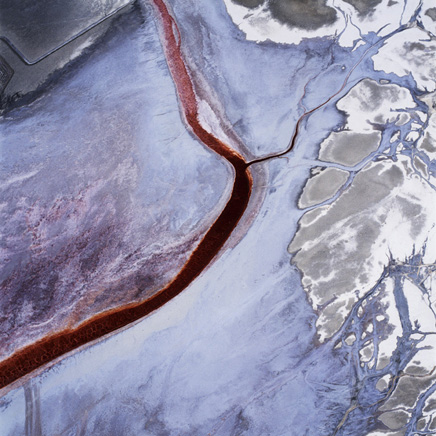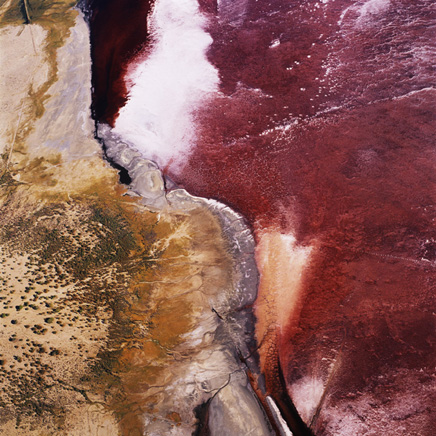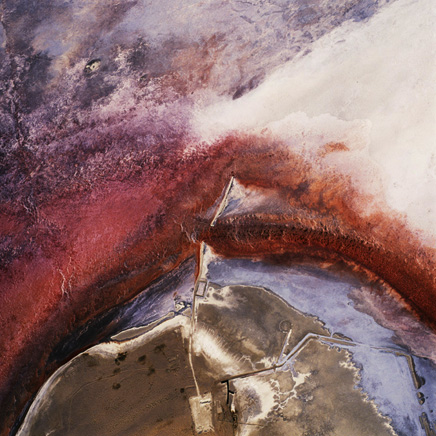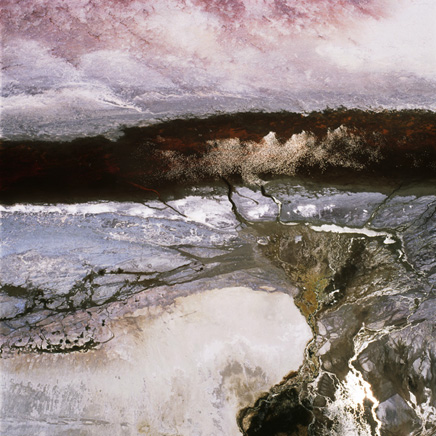The endgame, the absent, the void
For a variety of reasons, I found myself re-reading an interview I published on Archinect a few months ago with photographer David Maisel – and I really am so enamored with Maisel's work, and so interested in almost everything he has to say, that I thought I'd just post a quick reminder here for anyone who may have missed the interview when it first went up. At the very least, the images are stunning – but Maisel himself is also a thoughtful, funny, remarkably perceptive guy, so the interview itself, I think, justifies a second look.
Here, then, are some teasers, including images and quoted excerpts. If your interest is piqued: here's the actual interview.
 [Image: David Maisel, from The Lake Project].
[Image: David Maisel, from The Lake Project].
Maisel is perhaps best-known for his aerial photographs of Owens Lake, California. As cinephiles will no doubt remember, Owens Lake was drained in the early 20th century to water the lawns of suburban Los Angeles (a notorious act of hydrological theft that found its way into American mythology through Roman Polanski's film Chinatown). Owens Lake is now a Dantean wasteland, one of the most toxic sites in North America: [Image: David Maisel, from The Lake Project].
[Image: David Maisel, from The Lake Project].
From the interview:

 [Images: David Maisel, from The Lake Project].
[Images: David Maisel, from The Lake Project].
The rest of our conversation covers Californian hydropolitics, the line between architecture and photography, "replicant" landscapes, the dusty fate of human remains, Iceland, The Drowned World by J.G. Ballard, Mars rovers, 9/11, and the aesthetic power of sterility.
(Note: To read more about Ballard's The Drowned World, see BLDGBLOG's first post of 2006: Silt).
Here, then, are some teasers, including images and quoted excerpts. If your interest is piqued: here's the actual interview.
 [Image: David Maisel, from The Lake Project].
[Image: David Maisel, from The Lake Project].Maisel is perhaps best-known for his aerial photographs of Owens Lake, California. As cinephiles will no doubt remember, Owens Lake was drained in the early 20th century to water the lawns of suburban Los Angeles (a notorious act of hydrological theft that found its way into American mythology through Roman Polanski's film Chinatown). Owens Lake is now a Dantean wasteland, one of the most toxic sites in North America:
- The only moving things are the dust devils that coalesce and spin in the afternoon heat, swirling white towers of cadmium, arsenic, sulfur, chlorine, iron, calcium, nickel, potassium, aluminum, chlorine. The lakebed emits 300,000 tons of such matter every year; thirty tons of it arsenic, nine tons of it cadmium. We had dreamed of building cities, fields of glittering towers, urban fantasies meant to house our hopes of progress; now we seek out dismantled landscapes, abandoned, collapsing on themselves. Rather than creating the next utopia, we uncover the vestiges of failed attempts, the evidence of obliteration.
 [Image: David Maisel, from The Lake Project].
[Image: David Maisel, from The Lake Project].From the interview:
- "For the most part, I’m interested in landscape images not merely for what they look like, but for what they make us feel, and for what they might represent metaphorically. I’ve also wanted my pictures to take the viewer to places and sites they’ve never seen before, with a resulting sense of alienation or displacement. I'm less interested in being warm and fuzzy than in being harsh and cruel! [laughter] Those possibilities don’t exist when looking at the familiar."

 [Images: David Maisel, from The Lake Project].
[Images: David Maisel, from The Lake Project].The rest of our conversation covers Californian hydropolitics, the line between architecture and photography, "replicant" landscapes, the dusty fate of human remains, Iceland, The Drowned World by J.G. Ballard, Mars rovers, 9/11, and the aesthetic power of sterility.
(Note: To read more about Ballard's The Drowned World, see BLDGBLOG's first post of 2006: Silt).





Comments are moderated.
If it's not spam, it will appear here shortly!
I am helping my 8 year old daughter with a diorama on the California aquaducts.
This century was amazing for what we have accomplished, and horrific in our brutal lack of concern. Another story I foud was of a giant sequoia tree that was stripped of it's bark for an exhibit in New York, killing the tree.
We have been and are faced with our limitations as we grapple with drugs that kill us, plastics that poison us, medical procedures that mutilate us....
Slowly, so painfully slowly, we are coming to terms with the limitations of our power, and deeper respect for nature.
Thank you for the wonderful photos and beautiful words.
Post a Comment